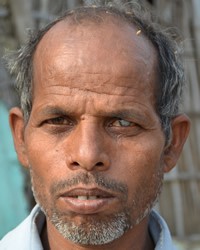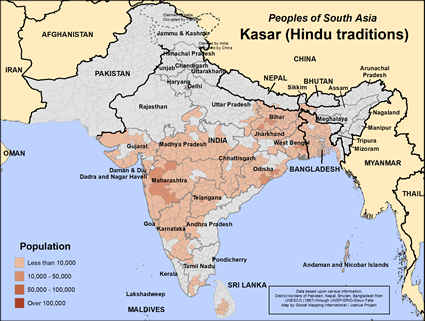Kasar (Hindu traditions) in India

Photo Source:
First Assembly of God, St. Joseph, MI
|

Map Source:
People Group data: Omid. Map geography: UNESCO / GMI. Map Design: Joshua Project.
|
| People Name: | Kasar (Hindu traditions) |
| Country: | India |
| 10/40 Window: | Yes |
| Population: | 669,000 |
| World Population: | 681,700 |
| Primary Language: | Marathi |
| Primary Religion: | Hinduism |
| Christian Adherents: | 0.02 % |
| Evangelicals: | 0.00 % |
| Scripture: | Complete Bible |
| Ministry Resources: | Yes |
| Jesus Film: | Yes |
| Audio Recordings: | Yes |
| People Cluster: | South Asia Hindu - other |
| Affinity Bloc: | South Asian Peoples |
| Progress Level: |
|
Introduction / History
The Kasar or Tambat are a people who live throughout the nation of India. Their traditional occupation is the production and sale of copper and brass items. Tambat in Marathi means copper. The cast of the Kasar depends on where they live. Some Kasar claim Kshatriya level, the second highest caste in Hinduism. In other areas they are seen as merchants or workers. In Maharashtra they are given Other Backward Caste designation making them eligible for special preferences for public jobs and university admission.
The primary language of the Kasar is Marathi. They also speak Hindi. Their native language depends much upon where they live in India.
What Are Their Lives Like?
The economic position of the Kasar varies widely. Some are wealthy factory owners. These factories used modern machinery to make metal vessels, idols, utensils, bangles (rigid bracelets) and musical instruments. Other Kasar shape metals items like their ancestors did using ancient techniques. One of their specialties is using a hard form of brass called bell metal. They shape bell metal into polished bells and cymbals. The price of copper has skyrocketed due to its value in electrical wire. Some Kasar have had to leave the metal working profession and find new employment in agriculture and manufacturing.
Literacy is a problem among the Kasar. Only 80% of the men and 65% of the women can read and write. The Indian government is working to raise those figures.
Some Kasar are vegetarians while others eat meat except for beef. Their principal foods are rice, wheat, vegetables and fruit.
The Kasar marry within their caste but not within their clan. Cousin marriages are forbidden. In times past, girls were married off young, from age 5 to 12. Now adult marriage is more common. Sons inherit property with the eldest son gaining possession of the family home.
The Kasar use Brahmin priests for important life ceremonies like births, weddings and funerals. The Kasar dead are cremated except for children who are buried. The ashes of the dead are put into a river.
What Are Their Beliefs?
The Kasar practice Hinduism influenced by folk religion. They worship and serve the gods of the Hindu pantheon. Kali, the goddess of sexuality and death, is their patron deity. They also worship Vishnu and his avatars Rama and Krishna. Hindus believe that by performing rituals and good works that they will attain moksha or freedom from the endless cycle of birth, death and rebirth. The Kasar visit Hindu temples and offer prayers, food, flowers and incense to their gods. There are many forms of Hinduism, each with its own deities and beliefs.
The main yearly holidays of the Kasar people are Holi, the festival of colors, Diwali, the festival of lights, Navratri, the celebration of autumn and Rama Navami, Rama's birthday.
What Are Their Needs?
The Kasar need to hear the life-changing gospel of Jesus Christ in an understandable way. They need help in educating their children and learning new jobs skills as their ancient profession is vanishing. The Kasar need to see the love and mercy of Christ lived out among them in practical ways by Christians.
Prayer Points
Pray the Lord will open the hearts of the Kasar people to desire God's blessings through a movement of family-based discovery Bible studies.
Pray that strong movements to Jesus will bring whole Kasar families into rich experiences of God's blessings.
Pray that God will overthrow spiritual forces of darkness opposing the spread of His Gospel among the Kasar people.